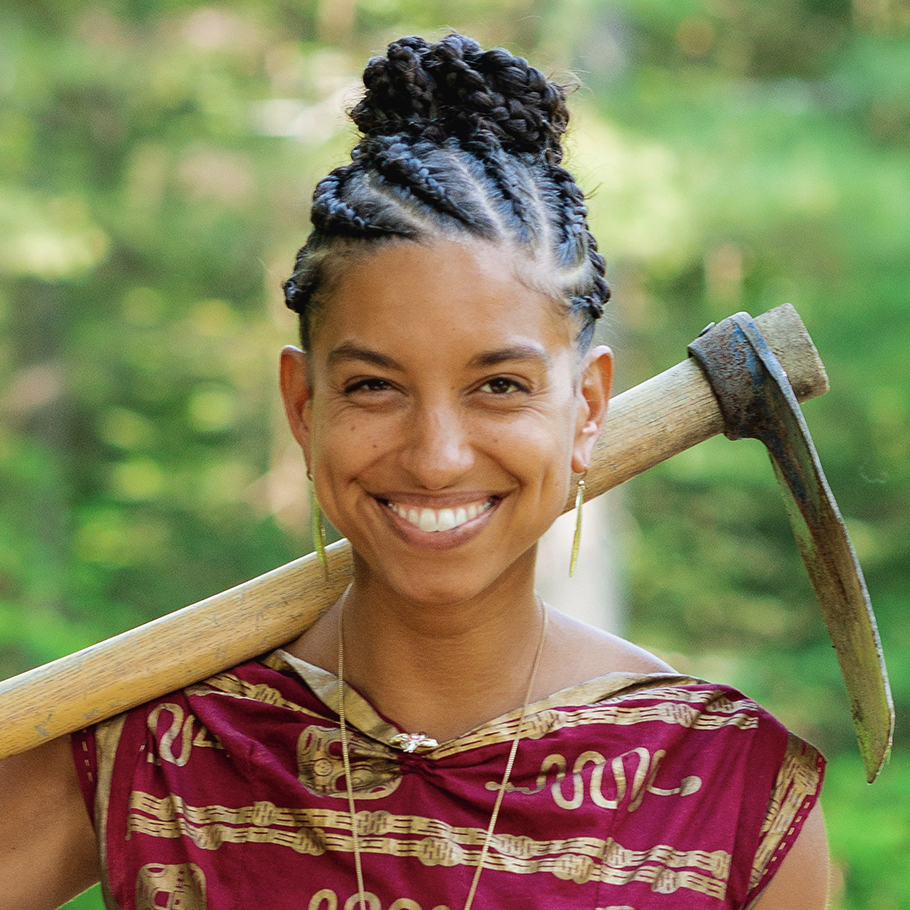
Leah Penniman’s Inspirational Keynote Address at the This Way to Sustainability Conference
by Sheryl Karas M.A., CRARS staff

Leah Penniman, co-founder of Soul Fire Farm and the author of “Farming While Black” was one of the highlights at the This Way to Sustainability Conference at Chico State, held virtually March 25-26, 2021. The theme for this year’s conference was “Resilience from the Ground Up: Strengthening Diversity in Soil, Communities and Economies,” so Ms. Penniman’s talk on “Uprooting Racism and Seeding Sovereignty in the Food System” was highly anticipated and well-attended. She gave a presentation that was enlightening, engaging, and thoughtfully delivered.
Leah Penniman was raised in Massachusetts and holds an MA in Science Education and a BA in Environmental Science and International Development from Clark University. Her experience with farming began as a teenager helping her grandmother in her garden and then working with The Food Project in Boston, MA. But her mission to end racism in the food system really caught fire when one of her children became sick with lead poisoning as a result of contaminated soil in the urban garden they were participating in. Testing found that a lot of the land in the area was similarly contaminated, and yet most poor and mostly brown or black people had very limited access to healthy fresh food unless they could use these abandoned lots to grow their own.
She and her partner Jonah Vitale-Wolff co-founded Soul Fire Farm, a working farm and teaching center, in 2011 with the mission of “ending racism and injustice in the food system and reclaiming the inherent right to belong to the earth and to have agency in the food system as Black and Brown people.” In her presentation Leah detailed the long history of Native Americans, Black people, Asians and Latinos being forced from their own ancestral lands and used for slave or low paid labor in the U.S. agricultural industry. She talked about how people of color were excluded from the right to own land at various times and how the Clan and other organizations forced people off their land even during the time period after 1910 when Black people were eligible to buy property and owned 16 million acres in the rural South. This led to a migration of about 6 million people to urban areas in the north, and that trauma is still held by their descendants around ever doing farm labor again. The consequences of that are what Leah and her family experienced living in the city—being disproportionately impacted by unequal access to fresh food by living in communities with no real grocery store other than tiny corner stores and fast food businesses. Barriers to getting healthy food caused by low income, time and the cost of transportation has led to skyrocketing levels of diet-related illnesses and health conditions.
At Soul Fire Farm Black and Brown people learn how to take back their inherent right to feed themselves. They are helped to reclaim their agrarian roots as they learn how to grow their own food in a way that is sustainable using Afro-Indigenous methods similar to what their ancestors once used. Many of those techniques are part of what we call regenerative agriculture today. Penniman used much of her presentation detailing those methods as well as those invented more recently by Black people to survive as farmers who were harshly discriminated against in the United States. Many of those innovations are ones we now take for granted. George Washington Carver, for example, promoted the use of legume cover crops such as peanuts and black-eyed peas to help regenerate the badly degraded soil Black and other rural poor farmers lived on. He also advocated for growing a diversity of crops that could be sold directly to the consumer through a subscription program. This was the foundation for the CSA (Community Supported Agriculture) model popularly used by many small farms today.
Participants at the conference were excited by the empowerment work of Soul Fire Farm and were very interested in how to do similar work in other parts of the country and around the world. Penniman suggested her book “Farming While Black(opens in new window)” as one starting place and provided a link to additional resources(opens in new window). Ultimately, though, she emphasized that listening well to what the people in any given community say they need in regards to environmental racism is the most important thing. Each community will have different resources and ideas about what would work best. Sometimes, for example, a church or neighborhood association could be more appropriate to take the lead instead of an explicitly environmental organization.
Learn more about Chico State University’s commitment to equity, diversity and inclusion(opens in new window).
Watch the entire Keynote presentation(opens in new window).
Learn more about the This Way to Sustainability Conference.(opens in new window)
